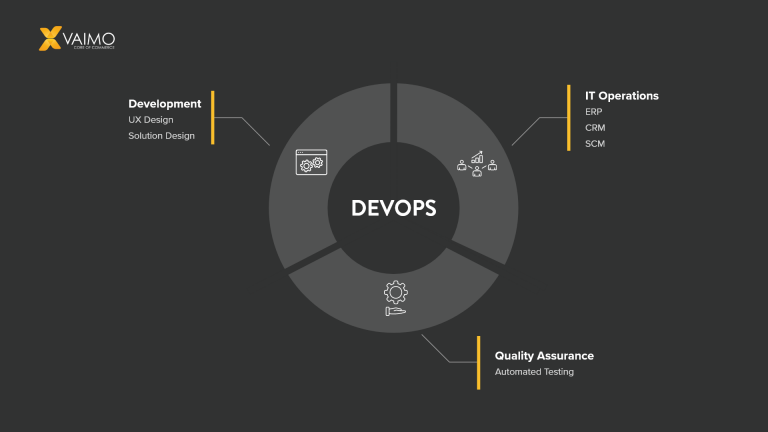There are countless options for powering ecommerce solutions. Now, we’re seeing a movement towards cloud solutions that provide an easier and more streamlined approach to hosting your online store.
TABLE OF CONTENTS
The adoption of ecommerce cloud services includes the rising popularity of Kubernetes. If you’re wondering about the benefits of Kubernetes for your ecommerce business, you’ve come to the right place.
First, let’s get the Kubernetes-related vocabulary out of the way.
Related Reading: Selecting an Enterprise Ecommerce Hosting Service
Traditional Hosting vs. Cloud Hosting
Traditional hosting involves running your business on physical servers, either on a dedicated server or on a shared server space. While this approach is a cost-efficient way to host a website, it creates a single point of failure. This means that if anything happens to this server, such as the failure of the hard drive, RAM, or power supply, it affects your business.
It also means you cannot respond quickly to sudden spikes in traffic. You would need to physically purchase or rent a server, and then configure it and connect it to a network in the data center. This may also lead you to invest in additional resources you might not end up using again once the influx of visitors slows down.
Cloud hosting, on the other hand, allows companies to use off-site servers for storage space, databases, control panels, and email accounts, among other things. Cloud hosting helps balance the load across multiple servers, meaning an individual server going down does not lead to lost information or downtime.
Cloud hosting lets you set up and provision computing resources within minutes. It also allows for a simpler application codebase, as the cloud takes care of some of the security, scalability, and backup features. Cloud hosting lets you respond to an influx of traffic quickly, without scrambling to find a costly solution.
Related reading: Serverless Ecommerce Integration is for Everyone
Cloud Hosting is the Key: IaaS, PaaS, and SaaS Explained
Infrastructure as a Service (IaaS)
Infrastructure as a Service (IaaS) refers to a scenario in which a cloud vendor manages the physical or cloud infrastructure on your behalf. Cloud or on-premise infrastructure can be provisioned, usually based on declarative configuration, which allows for keeping track of the state of the infrastructure and therefore improves security.
However, IaaS does not solve how you build, deploy, and deliver entire applications at scale and how your development team interacts with them.
Platform as a Service (Paas)
Platform as a Service (PaaS) is a managed platform that developers use to build, deploy and run applications. The client doesn’t have to worry about understanding infrastructure, observability and security needs, or specifics of application delivery pipelines. The vendor manages all of that for you and provides all necessary tooling for developers. All of your files and data are stored on the vendor’s servers or cloud solution instead of yours with these platforms.
That means that you don’t need enough space for your entire website on your infrastructure and can forget about having to worry about bandwidth if one of your pages gets popular.
Related Reading: Ecommerce Strategy 101 – Choosing a Platform and KPI Metrics
What is Kubernetes?
Kubernetes is an open-source system for automated deployment, scaling, and management of containerized applications. In other words, it is a platform that automates many of the manual processes involved in managing containers for your cloud-hosted business.
What Does Kubernetes Do?
- Groups containers that make up an application into logical units for easy management and discovery
- Sets rules on how to run those containers (for example: what should run in a container, how many should run at the same time, etc.)
- Schedules when those tasks should be executed so you can maintain your application’s availability and resource utilization
What Are the Benefits of Kubernetes for Ecommerce?
Improved Resilience
Kubernetes can help you build resilience into your application by automatically spinning up new instances of critical services in the event of server failure.
Kubernetes also provides built-in service discovery, which allows you to dynamically link the containers running on the host with any other component that needs them, such as load balancers or databases. This means that there is no need to update your configuration each time you spin up a new instance of an app—and even if one does fail, it won’t bring down its entire environment along with it.
Easier Scalability
Kubernetes allows you to scale your campaigns instantly by adding more computing power to your site while also ensuring performance and availability. Imagine having to configure every new server you want to add to your website or consider the time required to configure more servers for an increasing number of users.
Kubernetes makes scalability easier by allowing you to create multiple pods. A pod is a group of containers that are deployed on the same host machine. You can iterate faster on adding features without worrying about how your app will perform with more users.
This allows you to create products with high availability at lower costs due to increased automation and efficiency.
Zero Downtime
In traditional hosting, most mechanical or electric failures of physical infrastructure translate into availability problems for the site. Modern Cloud Kubernetes clusters prevent this with technology that assures that another hardware will take care of the loads of failed ones.
Many ecommerce apps use third-party software components that can fail, such as chat APIs or payment gateways. If one service fails, not only does it bring down its own instance but also every other component that relies on it to function correctly. This is where high availability and fault tolerance comes into the picture.
Kubernetes helps you build applications that are tolerant to failure. If a service goes down, its pods (collections of one or more containers deployed together as part of an application) will be restarted on healthy nodes.
An Agnostic Platform
As more organizations look to manage their applications across multiple cloud platforms, they need an easy way to do so. Kubernetes is open source software designed for portability – it can run anywhere in the public, private, or hybrid Cloud.
This gives organizations plenty of flexibility in where they deploy applications and how they scale them. Being cloud-agnostic also allows the Kubernetes community to drive innovations that extend beyond a single cloud provider’s feature set.
Related Reading: B2B Ecommerce Marketing Opportunity
How Kubernetes Works in Practice
At Vaimo, we have a Platform Engineering team to take care of our in-house platform to ensure it offers the best possible experience for our delivery teams. This makes our project deliveries more efficient as development teams do not have to install and configure tools such as logging and monitoring, metrics, build and deployment pipelines, security tools, and CDN.
The Vaimo platform is based on Kubernetes and extends that by adding a self-service portal that developers can use to get new projects up and running from scratch in minutes. This includes not only infrastructure but also code and configuration repositories, build and deploy pipelines, documentation setup, best-practice security policies, and CDN.
Our Platform makes second-day operations easy, as project setup is tracked in a Git repository keeping a record of all changes done on the infrastructure setup of the project. We’ve also built a Kubernetes operator to handle the deployment of Magento 2 on top of Kubernetes to help us manage many different moving pieces that need to be handled correctly to minimize downtime during deployment.
How Vaimo Can Help
At Vaimo, we’re very flexible to cater to your needs, be it fully cloud-native or on-premise setup. Perhaps you have your own OpenShift cluster you would like us to deploy, or maybe you need our help to get you started in your Kubernetes journey.
We’re a Kubernetes hosting provider, a full omnichannel agency, and one of the world’s most respected leaders in ecommerce. Vaimo clients enjoy several benefits of Kubernetes, including:
- Hosting service optimized for Adobe Commerce (Magento)
- Improvements to our platform that cascades to our clients with a minimal cost of work
- Efficient development practices ensure that maximum time is allocated to our clients’ online stores
Get in touch with our team of experts to learn how we can help you.








